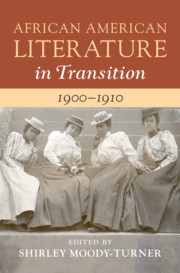Book contents
- African American Literature in Transition, 1900–1910
- African American Literature in Transition
- African American Literature in Transition, 1900–1910
- Copyright page
- Contents
- Figures
- Contributors
- Preface
- Acknowledgments
- Chronology, 1900–1910
- Introduction
- Part I Transitions in African American Authorship, Publishing, and the Visual Arts
- Part II New Negro Aesthetics and Transitions in Genre and Form
- Part III Modernist Masculinities and Transitions in Black Leadership
- Part IV Remapping the Turn of the Twentieth Century
- Chapter 10 Can the Black Subaltern Speak?
- Chapter 11 Race and Manhood in African American Representations of the Frontier
- Chapter 12 Narratives of Black and Chinese Citizenship after Plessy v. Ferguson
- Chapter 13 Black Transpacific Culture and the Migratory Imagination
- Index
Chapter 12 - Narratives of Black and Chinese Citizenship after Plessy v. Ferguson
from Part IV - Remapping the Turn of the Twentieth Century
Published online by Cambridge University Press: 29 April 2021
- African American Literature in Transition, 1900–1910
- African American Literature in Transition
- African American Literature in Transition, 1900–1910
- Copyright page
- Contents
- Figures
- Contributors
- Preface
- Acknowledgments
- Chronology, 1900–1910
- Introduction
- Part I Transitions in African American Authorship, Publishing, and the Visual Arts
- Part II New Negro Aesthetics and Transitions in Genre and Form
- Part III Modernist Masculinities and Transitions in Black Leadership
- Part IV Remapping the Turn of the Twentieth Century
- Chapter 10 Can the Black Subaltern Speak?
- Chapter 11 Race and Manhood in African American Representations of the Frontier
- Chapter 12 Narratives of Black and Chinese Citizenship after Plessy v. Ferguson
- Chapter 13 Black Transpacific Culture and the Migratory Imagination
- Index
Summary
At the end of the nineteenth century, the US annexation of Hawaii (1898) and imperial war in the Philippines (1899–1902) marked a radical shift in East-West relations and US foreign and domestic policies on the Asia-Pacific. This decade witnessed the simultaneous expansion of US empire in the Pacific and the proliferation of exclusion and restriction policies against Asian immigrants on US soil. This chapter mines the pages of the most influential of early Black literary magazines, the Colored American Magazine, and the lesser-studied works of one of its most celebrated contributors, Pauline E. Hopkins, to investigate the complex cross-racial and interethnic tensions and alliances that occur in Black writings from this period. Hopkins’s rhetoric of monogenesis and interracial kinship limned both the possibilities and limits of Afro-Asian linkages and connections against the US empire-state. A minor yet persistent theme in later African American and Asian American writings, this idea of shared kinship sought to challenge US colonialism and its taxonomic approach to racial difference. These writings contribute to an emerging Black American discourse on the Asia-Pacific.
Keywords
- Type
- Chapter
- Information
- African American Literature in Transition, 1900–1910 , pp. 299 - 321Publisher: Cambridge University PressPrint publication year: 2021

